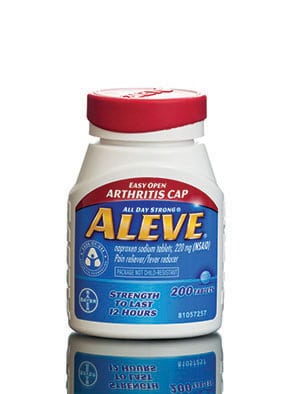Nonsteroidal anti-inflammatory drugs (NSAIDs), such as Advil (ibuprofen), Aleve (naproxen), and Celebrex (celecoxib), are among the most commonly used medicines. These drugs can have serious side effects, including gastrointestinal bleeding and sometimes heart attacks, yet they are often taken without medical oversight because many are available over-the-counter (OTC).
A national survey conducted in 2016 by the U.S. Pain Foundation, with support from McNeil Consumer Healthcare, found that while nearly all consumers (97 percent) say they feel confident when choosing which OTC pain reliever to take, many disregard important safety factors that are critical to selecting which is most appropriate for their health profile.

The survey found that consumers place the most value on how effectively and quickly a medicine will relieve their pain, rather than prioritizing factors that could seriously impact their health, such as their age and pre-existing medical conditions.
Top survey findings include:
• 45 percent do not consider the prescription medicines they are currently taking.
• 58 percent do not consider their pre-existing health conditions.
• 65 percent do not consider other OTC medicines they are taking.
• 73 percent of those 60 and over do not consider their age.
• 20 percent do not consider any of these important safety factors.
Now, researchers have found that 15 percent of adult ibuprofen users exceed the maximum recommended dose of ibuprofen or other NSAIDs in a one-week period. Exceeding the daily limit often followed taking too much of a single NSAID at one time, taking two different NSAIDs at the same time, or failing to wait long enough before taking another dose.
Six tips for choosing and using OTC pain relievers responsibly:
• Choose the OTC pain reliever that’s right for you based on your health profile.
• Always read and follow the Drug Facts label—whether it’s the first time or the hundredth time you’ve taken the medicine. Drug Facts labels change, and so does our health.
• Stick to the recommended dose.
• Keep track of other medicines you are taking and how they might interact. Know the active ingredient in your medicine and take only one medicine that contains the same type of active ingredient at a time.
• Avoid taking OTC pain relievers longer than directed on the label, unless told to do so by your healthcare provider.
This article was adapted from information provided by U.S. Pain Foundation, McNeil Consumer Healthcare, and Boston University School of Medicine.
This article is for informational purposes only. For specific advice about your situation, consult a qualified healthcare professional.



